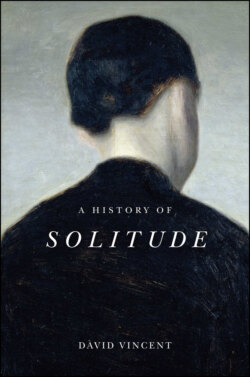A History of Solitude

Реклама. ООО «ЛитРес», ИНН: 7719571260.
Оглавление
David Vincent. A History of Solitude
CONTENTS
Guide
Pages
A HISTORY OF SOLITUDE
ACKNOWLEDGEMENTS
1 INTRODUCTION: SOLITUDE CONSIDERED ‘Zimmerman on Solitude’
The Modern History of Solitude
The Tally Ho Stakes
Notes
2 SOLITUDE, I’LL WALK WITH THEE. Clare, Keats, and Solitude
The Crusoe of His Lonely Fields
Rambling
The Wild
A Life Apart from Other Things
Notes
3 HOME ALONE IN THE NINETEENTH CENTURY. The Threat of Idleness
Patience and Other Pastimes
Networked Solitude
Out of Doors
The Invalid in the Home
Notes
4 PRAYERS, CONVENTS, AND PRISONS. Solitary Spiritual Communication
Enter into Thy Closet
Sisterhoods and Convents
The Terrors of Solitude
To be Alone with Him
Notes
5 SOLITUDE AND LEISURE IN THE TWENTIETH CENTURY. Peace and Quietness
Comfort and Communication
The Pleasures of Solitude
A Companion to Me in Solitude
Fishing and the Universe
Notes
6 THE SPIRITUAL REVIVAL. The Immense Indifference of Things
Exploring Nature
Nautical Solitude
Modern Solitary Confinement
The Monastic Revival
The New Spiritualism
Notes
7 THE ‘EPIDEMIC OF LONELINESS’ REVISITED. The Rise of Loneliness
The Panic
Loneliness and Solitude
Notes
8 CONCLUSION: SOLITUDE IN THE DIGITAL ERA
Notes
INDEX. A
B
C
D
E
F
G
H
I
J
K
L
M
N
O
P
Q
R
S
T
U
V
W
Y
Z
POLITY END USER LICENSE AGREEMENT
Отрывок из книги
To the memory of Veronica Weedon, 1919–2017
This book has been researched in the deep quiet of the rare books rooms in the British Library and the Cambridge University Library, and I thank their staff for their patience and efficiency. As the project was commencing one Armistice Day, the public address system in the latter’s Rare Books Room made the oddly unfeasible request of its readers that they observe a silence for the fallen. Even in the depths of a library, solitude has to be managed.
.....
If the heart be pure, the disposition cheerful, and the understanding cultivated, temporary sequestrations from general or even private intercourse, will improve the virtues of the mind and conduce to happiness; but when the soul is corrupted, and myriads of depraved images and wishes swarm in the tainted imagination, Solitude only serves to confirm and aggravate the evil; and by keeping the mind free to brood over its rank and noxious conceptions, becomes the midwife and nurse of its unnatural and monstrous suggestions.73
States of mind in solitude and the capacity to make transitions between solitude and sociability were issues that had to be addressed by every following generation in the modernizing world. Zimmermann’s own answers were of his time and conditioned by his identity as a Protestant, urban intellectual. The urgency of his treatise stemmed from a sense of the deep instability of the prevailing balance of solitude and sociability. There was a tension in Solitude Considered between an endorsement of the emerging urban civilization and a reaction against its trivializing effects that went back to Petrarch and Virgil and forward to successive cohorts of critics as populations in Western Europe increasingly clustered in towns and cities. The efficacy of the movement between society and solitude went both ways. Those who had ‘their faculties narrowed by continual intercourse with vanity and nonsense’, Zimmermann observed, were in no fit state to ‘relish the delights of seclusion’.79 It was not just the major population centres. The treatise contains a heartfelt condemnation of the superficial dramas of provincial living, derived from its author’s long and increasingly resented sojourn in Brugg, the small town near Zurich where he was born and to which he later returned as chief medical officer.80 The danger derived from a sense that the elite culture of the period was hard-wired for retirement in the face of the excesses of urban civilization. Zimmermann both sympathized with this reaction and feared its consequences. It would be impossible to maintain the forward momentum of the associative project of the Enlightenment if its leading members were, like Rousseau, continually looking over their shoulders at the attractions of sylvan retreats.
.....